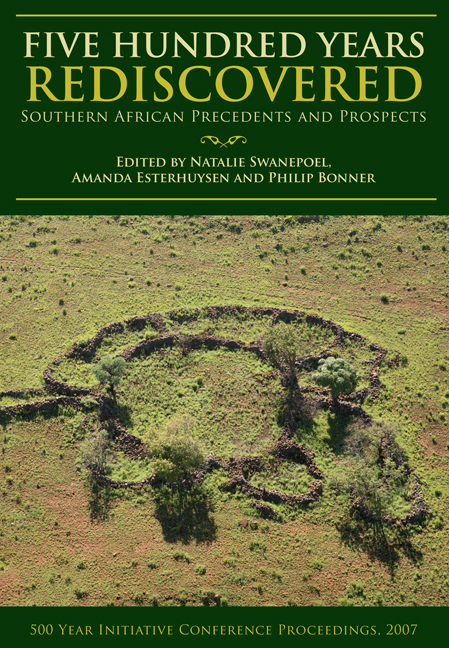Book contents
- Frontmatter
- Contents
- Preface
- 1 Introduction
- Section 1 Disciplinary Identities: Methodological Considerations
- 2 Historical archaeologies of southern Africa: precedents and prospects
- 3 South Africa in Africa more than five hundred years ago: some questions
- 4 Towards an outline of the oral geography, historical identity and political economy of the Late Precolonial Tswana in the Rustenburg region
- 5 Metals beyond frontiers: exploring the production, distribution and use of metals in the Free State grasslands, South Africa
- 6 deTuin, a 19th-century mission station in the Northern Cape
- 7 Reinterpreting the origins of Dzata: archaeology and legends
- Section 2 Material Identities
- Section 3 ‘Troubled Times’: Warfare, State Formation and Migration in the Interior
- List of contributors
- Index
7 - Reinterpreting the origins of Dzata: archaeology and legends
from Section 1 - Disciplinary Identities: Methodological Considerations
Published online by Cambridge University Press: 30 May 2019
- Frontmatter
- Contents
- Preface
- 1 Introduction
- Section 1 Disciplinary Identities: Methodological Considerations
- 2 Historical archaeologies of southern Africa: precedents and prospects
- 3 South Africa in Africa more than five hundred years ago: some questions
- 4 Towards an outline of the oral geography, historical identity and political economy of the Late Precolonial Tswana in the Rustenburg region
- 5 Metals beyond frontiers: exploring the production, distribution and use of metals in the Free State grasslands, South Africa
- 6 deTuin, a 19th-century mission station in the Northern Cape
- 7 Reinterpreting the origins of Dzata: archaeology and legends
- Section 2 Material Identities
- Section 3 ‘Troubled Times’: Warfare, State Formation and Migration in the Interior
- List of contributors
- Index
Summary
Introduction
In tourism brochures, Venda is referred to as the Land of Legends. This is very apt, as there are numerous stories, tales, legends and myths about the origins of the Vhavenda people, their customs and beliefs, as well as about the land that they inhabit, namely in the northeastern part of Limpopo Province along the Soutpansberg Mountain Range, northwards into the southern part of Zimbabwe.
It is precisely this plethora of ‘legends’ that makes research in this area interesting, yet problematic, from the point of view of the archaeologist. The oral history is often contradictory, particularly where political status and intrigue are involved. This became more so with the development of the Thulamela site in the Pafuri area of the northern Kruger National Park, with a conflict of interests between certain Venda and Tsonga clans. With the events leading up to the development and declaration of the Mapungubwe National Park and World Heritage Site, interest amongst local communities increased and claims were made by a variety of different local communities that they were descended from the kings of Mapungubwe.
This has led to new legends being created, where tourists who visit certain Venda villages are told that the people living there are the descendants of tribes that migrated from the north, and who settled at Mapungubwe on their way southwards to the Soutpansberg Mountains (Maphangwa 2003). Some go further to say that they were responsible for the building of the walls at Great Zimbabwe, before moving to Mapungubwe. Again, Mapungubwe was abandoned and these people then settled in the Soutpansberg (S. Moeti 2005 pers. comm.). Further claims were made by a Tsonga clan, who claimed that they had migrated from the Zambezi Valley and settled at Mapungubwe, before moving southeastwards into Mozambique (Hanisch 2003). It is noteworthy that Prof N.V. Ralushai, who was commissioned to undertake research into the oral history of Mapungubwe, could not find any evidence of legends or knowledge relating to Mapungubwe other than in a song originating amongst the Vhangona (Ralushai 2005). Further research on the Zimbabwean side of the Limpopo River amongst people claiming to be Venda, elicited no knowledge of Mapungubwe other than that of recent origin related to the archaeological work undertaken at various times since the late 1960s (Ralushai 2006 pers. comm.).
- Type
- Chapter
- Information
- Five Hundred Years RediscoveredSouthern African precedents and prospects, pp. 119 - 132Publisher: Wits University PressPrint publication year: 2008



